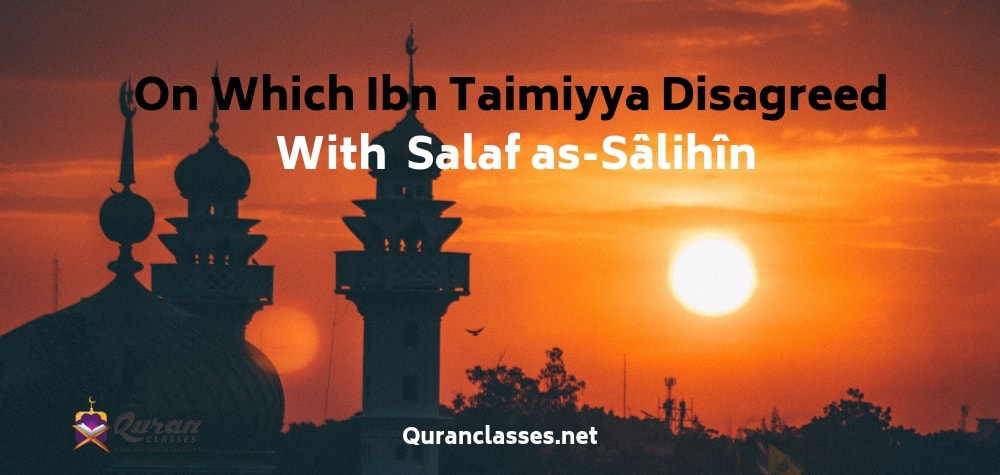Sujood GoldenTip For Increasing Your Khushu’ (Humbleness) in Prayer
February 11, 2019Ghusul
February 11, 2019
On Which Ibn Taimiyya Disagreed With Salaf as-Sâlihîn
Taj ad-dîn as-Subkî listed the matters on which Ibn Taimiyya disagreed with Salaf as-sâlihîn as in the following:
1 – He said, ‘Talâq (divorce as prescribed by Islam) does not become actual; [in case it happens,] it is necessary to pay kaffâra (equal to that which is paid) for an oath.’ None of the Islamic scholars that came before him had said that kaffâra would be paid.
2 – He said, ‘Talâq given to a hâid (menstruating) woman does not become actual.’
3 – He said, ‘It is not necessary to make qadâ for a salât omitted deliberately.’
4 – He said, ‘It is mubâh (permissible) for a hâid woman to perform tawâf of the Ka’ba. [If she does] she will not have to pay kaffâra.’
5 – He said, ‘One talâq given in the name of three talâqs is still one talâq.’ However, before saying so, he repeatedly said for many years that ijmâ’ al-Muslimîn was not so.
6 – He said, ‘Taxes incompatible with Islam are halâl for those who demand them.’
7 – ‘When taxes are collected from tradesmen, they stand for zakât even if they do not intend [for zakât],’ he said.
8 – He said, ‘Water does not become najs when a mouse or the like dies in it.’
9 – He said, ‘It is permissible for a person who is junub to perform supererogatory salât without making a ghusl at night.’
10 – He said, ‘Conditions stipulated by the wâqif (person who devotes property to a pious foundation) are not taken into consideration.
11 – He said, ‘A person who disagrees with ijmâ’ al-umma does not become a disbeliever or a sinner.’
12 – He said, ‘Allâhu ta’âlâ is mahall-i hawâdith and is made up of particles coming together.’
13 – He said, ‘The Qur’ân al-kerîm was created in the Dhât (essence, person) of Allâhu ta’âlâ.’
14 – He said, ‘The ’âlam, that is, all creatures are eternal with their kinds.’
15 – He said, ‘Allâhu ta’âlâ has to create good things.’
16 – He said, ‘Allâhu ta’âlâ has a body and directions; He changes His place.’
17 – He said, ‘Hell is not eternal; it will go out at last.’
18 – He denied the fact that prophets are innocent.
19 – He said, ‘Rasûlullah [sall-Allâhu ta’âlâ ’alaihi wa sallam] is no different from other people. It is not permissible to pray through his intercession.’
20 – He said, ‘It is sinful to go to Medina with the intention of visiting Rasûlullah.’
21 – He also said, ‘It is harâm to go there to ask for shafâ’a (intercession).’
22 – He said, ‘The books Tawrât and al-Injîl did not change in vocabulary. They changed in meaning.’
“Some scholars said that most of the above-quoted statements did not belong to Ibn Taimiyya, but there has been none who denied his saying that Allâhu ta’âlâ had directions and that He was made of particles coming together. However, it was declared by consensus that he was rich in ’ilm, in jalâla and in diyâna. A person who has fiqh, knowledge, justice and reason must first observe a matter and then decide about it with prudence. Especially, judging Muslim’s disbelief or apostasy or heresy or that he must be killed requires very minute observations and utter circumspection.”
Recently it has become fashionable to imitate Ibn Taimiyya. They defend his heretical writings and reproduce his books, particularly his Al-wâsita. From beginning to end, this book is full with his ideas unconformable to the Qur’ân al-kerîm, the Hadîth ash-sherîf and ijmâ’ al-Muslimîn. It rouses great fitna and faction among the readers and causes hostility between brothers. The Wahhâbîs in India and those ignorant men of religion who were caught in their traps in other Muslim countries have made Ibn Taimiyya a banner for themselves and have given him such names as ‘Great Mujtahid’ and ‘Shaikh al-Islâm.’ They embrace his heretical thoughts and corrupt writings in the name of faith and îmân. For stopping this terrible current, which brings about faction among Muslims and demolishes Islam from within, we must read the valuable books written by the scholars of Ahl as-Sunna which refute and rebut these heretics with documents. Among this literature, the Arabic book Shifâ as-siqâm fî ziyâr a ti khayri ’l-anâm written by the great imâm and the profoundly learned scholar Taqî ad-dîn as-Subkî (rahmatullâhi ta’âlâ ’alaih) destroys Ibn Taimiyya’s heretical ideas, eliminates his faction and exposes his obstinacy. It prevents the spreading of his evil intentions and wrong beliefs.



